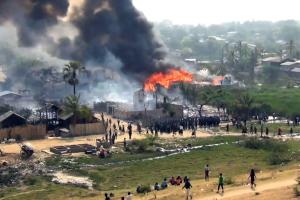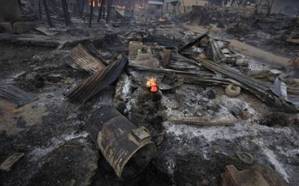Over the last two years, the positive news of a Myanmar embracing democracy and engaging with the developed world has been consistently offset by reports of sectarian violence between Buddhists and the minority Rohingya Muslim population. Estimates suggest that 300 Muslims have been killed and up to 300,000 displaced as refugees since the military junta nominally ceded power in 2011. No longer is this violence restricted to the state of Rakhine where the majority of Burmese Muslims live. Major incidents are reported in states as far south as Thaketa, just a few miles from Yangon, the cultural, historic and business capitol of the country which is now awash with western businessmen drinking expensive cocktails in expensive hotels. This worrying trend of more frequent and more widely spread violence threatens to derail the country’s turnaround.
As violence in Myanmar creeps closer to the capitol, shown below, the genocide taboo creeps closer to the consciousness of the west.
The violence we are forced to consider here is of the most disturbing kind — indiscriminate, brutal, and deadly. A further disturbing element is the widespread belief that government forces are supporting the violence by turning a blind eye. There are many reports of government forces standing by and, if not actively encouraging, being less than heavy-handed with Buddhist perpetrators. There is some convincing video evidence of this around the news sites and on YouTube. Convictions relating to sectarian violence have been proportionately more prevalent for Muslims who have also seen harsher sentences handed down. Despite political reforms, power is still in the hands of the military, and currently concentrated in the hands of exclusively ethnic Burmese Buddhists.
For those who believe that “genocide” is too shocking a term to use here, I would respond: The Rakhine Buddhists refer to the Rohingya as Bengali rather than Burmese and believe they are illegal immigrants despite their having settling in the Rakhine region centuries ago. By denying their history and denying the Rohingya’s right to call Myanmar home, I believe the term “genocide” can be used without hyperbole to describe this systematic approach to removing an ethnic minority. Human Rights Watch (HRW) agrees.
This makes my recent Sunday morning browse of the papers all the more extraordinary: Continue reading →



